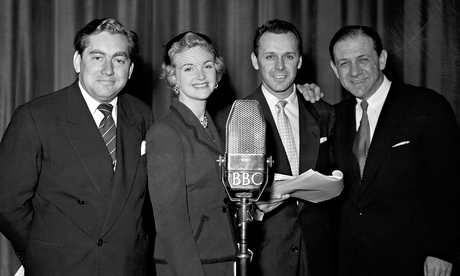
The actor and comedian Bill Kerr, who has died aged 92, was a master of laconic understatement. Having begun his British variety career in the late 1940s as "the boy from Wagga Wagga", he became a household name as a perfect foil for Tony Hancock in six series of the wildly popular BBC radio show Hancock's Half Hour (1954-59).
Playing Hancock's breezy and good-hearted Australian lodger, Kerr was often given the best lines by writers Ray Galton and Alan Simpson because of his deadpan delivery. His main function was to relentlessly encourage Hancock's grandiose schemes, subsequently exploited by Sid James, only to be thwarted by the voice of officialdom (usually Kenneth Williams), or to suggest ludicrous ventures of his own, immediately pounced upon by the gullible Hancock: "You know, that's a very good idea, Bill!"
He was chosen for the show, over Hancock's suggested Graham Stark, because it was thought his Australian accent would be a fine contrast to the star's theatrical, delusional ramblings. In a television interview years after Hancock's death, it was Kerr who pointed out the similarity between the great comedian and Mr Toad: "The bluster, the pomp, the dignity, the frailty."
The comic chemistry, with Moira Lister, Andrée Melly and then Hattie Jacques added to the mix, was potent and the generosity of the ensemble playing impeccable. Recordings were joyous occasions; Kerr and James can sometimes be detected laughing helplessly along with the audience during Hancock's diatribes. According to Kerr, the producer regularly had to halt the recording because the cast was laughing so much.
Kerr was second-billed for the first couple of series, but in later episodes the role of James as the star's shady sidekick was expanded and he took lower billing. His character also changed, becoming more blatantly dim-witted, the constant butt of Hancock's derision. When the show moved to television, it did so without him. Kerr, a down-to-earth professional not given to temperament, took it all in his stride, and found plenty of other work in stage and television, and in films.
Kerr was born into a showbusiness family in Cape Town, South Africa, while his Australian parents were on a lengthy tour, and was on stage when he was just a few weeks old. "My mother took about 10 weeks off to have me," he told the West Australian newspaper in 1995, "and when she returned to the stage the producers said rather than bother with a doll for the baby, why didn't she use me?"
A few years later, the family returned to Australia and settled in Wagga Wagga, New South Wales. He became a child star, billed as Wee Willie Kerr, the Jackie Coogan of Australian Vaudeville, and appeared in several films in the 30s.
After the second world war, during which he served in the army and, with his friend Peter Finch, staged many shows in Australia and overseas, he moved to Britain to try his luck and devised an attention-grabbing stage persona welcomed on the variety circuit and in radio shows such as Variety Bandbox: a challenging, stony-faced malcontent who always prefaced his act with the catchphrase "I'm only here for four minutes" and often went on to discourage patrons from sitting in the balcony – "It doesn't look too safe to me" – or warn them against enjoying themselves too much: "While you're here your homes are probably being burgled."
After leaving Hancock, Kerr worked in a Doctor Who series with Patrick Troughton, and had a long-running part in the 60s BBC television soap Compact. He also formed a stage relationship with Spike Milligan, appearing with him in The Bedsitting Room at the Mermaid theatre (1963) and the Saville (1967). In 1972 he co-starred with Anthony Newley in the Newley/Bricusse musical The Good Old Bad Old Days.
He also had supporting roles in many films, including The Dam Busters (1955), The Captain's Table (1959), The Wrong Arm of the Law (1963), Doctor in Distress (1963) and A Funny Thing Happened on the Way to the Forum (1966).
He moved back to Australia in 1979 and continued his career as a reliable character actor in films, notably with a key role in Gallipoli (1981): his is the first voice heard in Peter Weir's first world war epic. On stage, he toured as Doolittle in My Fair Lady in the 1980s. In addition to his more serious work, he continued to appear in comedies, including Let's Get Skase (2001). In 2011 he joined the Walk of Honour in Wagga Wagga.
His wife, Sandra, and their two children survive him, as do two children from a previous marriage.
• William Henry Kerr, actor and comedian, born 10 June 1922; died 28 August

